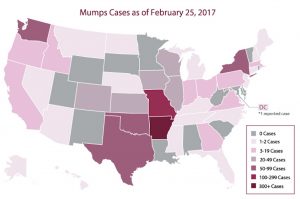Mumps outbreaks in Lake and DeKalb counties
Jean Lotus for Chronicle Media — March 21, 2017
Graphic credit:
CDC graphic. Preliminary data reported to CDC. Mumps outbreaks are not reportable.
Five confirmed cases of mumps among adults and students at Barrington High School were reported by the Lake County Health Department as of March 15.
Additionally, there are seven more probable cases at the high school, as well as 20 “suspect” cases, the health department reported.
“I’ve been here 20 years and this is the first time I know of that there have been so many cases,” said Leslie Piortowski, spokesperson for the Lake County Health Department.
Statewide, 58 cases of mumps have been reported to the Illinois Department of Public Health. So far in 2017, DeKalb and Lake counties have recorded the highest number of confirmed and probable cases at 14 and 13 respectively. Chicago reported five and suburban Cook County reported eight.
In DeKalb, 12 confirmed cases, and two probable cases, were reported by the DeKalb County Health Department. All were “related to Northern Illinois University,” said Cindy Graves, director of community health and prevention.
Mumps is a viral disease that is no longer common in the U.S., but outbreaks sometimes occur, according to the Centers for Disease Control. Outbreaks are most likely in places where people have had “prolonged, close contact with a person who has mumps, such as attending the same class, playing on the same sports team, or living in the same dormitory,” the CDC website says.
The virus is passed through saliva or mucus droplets sprayed when an infected person coughs, sneezes or talks. Sharing cups, utensils or food-serving items may also spread the virus.
Symptoms include fever, muscle aches, lethargy, headaches, appetite loss and swollen salivary glands. Some cases are so mild, the infected person doesn’t even realize they have mumps, according to the Lake County Health Department website.
Those who get mumps are considered contagious two days before until five days after swelling, and are advised to stay home and contact a doctor. The illness can be confirmed with a cheek swab.
Barrington D220 said it would be partnering with the county health department to conduct a vaccination clinic for adults and students who needed a second dose of the MMR (measles, mumps, rubella) vaccination.
Three persons at Barrington HS with confirmed cases of mumps did not have access to vaccination records, and one had only had a single MMR dose, said Leslie Piortowski, spokesperson for the Lake Co. Health Dept.
“The cases are children, adults and the whole age range,” she said.
The high school announced a special deep cleaning of the school and buses.
In addition to the high school, Lake County reported several suspected and probable cases in other Barrington schools. Station Middle School had three probable and six suspected cases; Prairie Campus School had five suspected cases and Roslyn Road School had one suspected case. One other confirmed case in Barrington was not associated with a school, Piortowski said.
In Lincolnshire, there was one confirmed case at Daniel Wright Junior High School and suspected cases at Fremont Middle School in Mundelein, Libertyville High School and Carmel High School. The health department said there were four more suspected cases in the county not school-related and one probable case in Lake Zurich that was connected to a Barrington HS case.
“Mumps outbreaks are currently occurring across the nation primarily in schools or environments where people closely interact and it spreads person-to-person,” Piortowski said. “The issue is that the vaccine is not 100 percent effective, and not everyone is vaccinated.”
In 2016, the Centers for Disease control reported 5,311 cases of mumps in 39 states. Illinois had 335 confirmed and probable cases during 2016, said Melaney Arnold, spokeswoman for the Illinois Department of Public Health.
The health department recommended covering mouths when coughing, washing hands often and not sharing eating utensils. The guidelines also recommended “disinfecting frequently touched surfaces, such as toys, doorknobs, tables and counters.”
“With spring break approaching, and other warm-weather social events coming up, students should be particularly cautious, especially if they are planning to travel,” said Mark Pfister, the new executive director of the health department.







